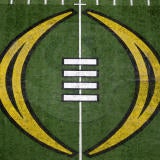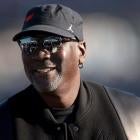Like it never happened.
Like that dark day on July 23, 2012 in Indianapolis was merely a stage show. A bad off-Broadway show at that, meant to show the awesome overriding strength of the NCAA.
A lot of us were there. We know now.
You remember, don't you? Big press conference. Big bluster. Big penalties.
They told us the culture of winning at Penn State had enabled Jerry Sandusky's molesting dozens of children. Joe Paterno's inattention to the horrific acts allegedly was also to blame.
This just in: The NCAA agreed to a settlement Friday of a lawsuit brought by state senator Jake Corman and treasurer Rob McCord.
This just realized: That settlement essentially finalizes the rescinding those penalties.
In reality, it was an admission of a massive overreach by the NCAA. It deflects the blame back on the association for the penalties in the first place.
Where does college athletics go from here?
It's only been 2 1/2 years. All that bluster, gone. It will be a roll back that will last a lifetime. Yes, the NCAA overreached. They have finally admitted as much.
Something changed. Perhaps the NCAA leadership's taste for another courtroom battle. Check their record on that front, lately.
Perhaps the NCAA was infused with a sense of fairness, common sense. If that's the case this, then, was a settlement that requires an apology.
They told us they had authority to knee-cap Penn State football. They told us on July 23, 2012 it was written right there in the NCAA constitution.
Except it wasn't. That's basically what the NCAA agreed to Friday: It's authority to impose such sanctions didn't exist.
Ever.
Thank God.
Back in the books, 111 of Joe Paterno's now-restored record of 409 victories. Those wins were vacated on that epically infamous day 2 1/2 years ago.
Back in the court of public opinion -- the NCAA's ability to even exist.
As the association formally cedes power to the five highest-resource conferences at its annual convention, we're left to wonder why Big Brother continues to draw breath.
The Big Ten, Pac-10, ACC, Big 12 and SEC will soon be basically governing themselves. After autonomy is voted in Saturday, players will be paid and any program that can't do so -- see the low-resource Group of Five -- will wither or perish.
It was written in an autonomy resolution last year that NCAA enforcement will next be dealt with in a meaningful way, perhaps by next year's convention. Outsourced enforcement is a possibility.
That's because the only meaningful influence the NCAA has over big-time football is enforcement. The playoff extravaganza we just witnessed? Manufactured and staged by the 10 FBS conferences. The Power 5 getting the overwhelming majority of the payout.
Most important -- for better or worse -- the NCAA doesn't get a dime.
Friday's settlement defined the NCAA's look in the 21st century.
It was bad enough that its bureaucrats fast-tracked those unprecedented Penn State penalties. But the final, ignominious blow was taking away Joe's wins. What is usually considered a paper penalty -- vacating victories -- became a knife in the back to the Paterno family.
You are allowed to surmise that Paterno may have been negligent in the Sandusky affair, that the administration valued football over victims' welfare. That's your opinion. But the paper penalty was vindictive. The NCAA took that knife and twisted it.
The association, then, cowered on Friday. On the same day it introduced a "Let's Dance" campaign (relating to the NCAA tournament), it moon-walked -- essentially backtracked -- on helping create the biggest scandal in college history.
As I've mentioned before, it's hard to determine what was more outrageous: the penalties themselves or the serial repeal of them less than three years later.
This is not to say Sandusky is any less of a demon or the victims shouldn't be priority No. 1. But the NCAA reached too far -- totally and horribly.
In short order it had restored Penn State's scholarships and bowl eligibility. On Friday, it admitted that all those games won by Paterno using those innocent Penn State players did indeed count.
The association also admitted -- out loud -- that this new agreement is "replacing" the controversial consent decree that Penn State agreed to in 2012.
The same consent decree that was called an NCAA "cram down" by a Penn State attorney.
In the last week, Oregon State president Ed Ray -- former chairman of the NCAA executive committee -- admitted he barely scanned the Freeh Report before pronouncing a sentence on Penn State.
The same Ed Ray -- USA Today reported Thursday -- was believed to have voted in favor of the death penalty.
Don't forget reports that the NCAA "bluffed" Penn State with the threat of a death penalty to begin with.
Friday became equal parts exoneration for Penn State and a reminder of the NCAA hierarchy's faux power. In essence, whatever the awesome, overriding strength the NCAA flexed on that day 2 1/2 years ago in Indy, today makes the association look like Scrawny Arms Rob Lowe.
"Today's agreement reaffirms the NCAA's authority to act, said Kirk Schulz, Kansas State president, and NCAA board of governors.
That's one way of looking at it. Here is another -- without the spin. You caved, Mark Emmert, because you were wrong in the first place. I'm glad I saved the tape from that dark day July 23, 2012 because today it reflects a mockery of the penalties, the NCAA and its high-level administration.
"Sports can become too big to fail," Emmert said in pronouncing sentence on Penn State, "indeed to big to even challenge."
Prior to Friday the same could have been said of the NCAA.
Now it's like the Penn State case never happened.
Where does college athletics go from here?





















